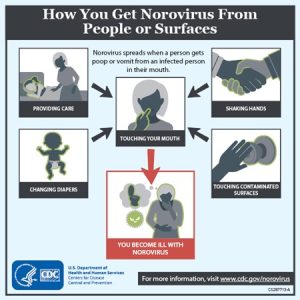What is Norovirus?
Commonly referred to as “food poisoning” or a “stomach bug,” noroviruses are the most common cause of gastroenteritis in the United States of America. Norovirus causes inflammation of the stomach or intestines. This is called acute gastroenteritis.
What are the symptoms of Norovirus?
A person usually develops symptoms 12 to 48 hours after being exposed to the virus. If you have norovirus, you can feel extremely ill. The main symptoms are:
- Diarrhea and vomiting can occur several times a day.
- Vomiting
- Nausea
- Stomach pain
- Fever
- Headache
- Body aches.
Multiple episodes of vomiting and diarrhea can cause dehydration. Symptoms of dehydration are decreased urination, dry mouth and skin, and dizziness. Infants may be fussier and have decreased wet diapers.
How does Norovirus spread?

Norovirus is very contagious and spreads easily from person to person. The virus is found in the stool and vomit of infected people. People can become infected in several ways, including eating food or drinking liquids that are contaminated by infected food handlers, touching surfaces or objects contaminated with norovirus and then touching their mouth before hand washing, or having direct contact with another person who is infected and then touching their mouth before hand washing.
Outbreaks also have occurred from eating undercooked oysters harvested from contaminated waters. Proper cooking kills the virus. Drinking water contaminated by sewage can also be a source of illness.
Persons working in day-care centers or nursing homes should pay special attention to children or residents who have symptoms of norovirus. The virus can spread quickly in these types of facilities.
What is the treatment for Norovirus?
Antibiotics will not work on norovirus. Staying hydrated is important. If symptoms persists, worsen or dehydration is suspected, contact your health care provider.
If I have norovirus, how long am I contagious?
People infected with norovirus are contagious from the moment they begin feeling ill to at least three days after symptoms stop. Some people have been contagious for as long as two weeks after symptoms stop. Good hand washing is important. Persons infected with norovirus should not prepare food while they have symptoms and for three days after their symptoms stop. Infected people do not become long-term carriers of norovirus, so a person can get norovirus multiple times if re-exposed.
Do infected people need to be excluded from school, work or daycare?
Since the virus is passed in vomit and stool, it is recommended that children not attend daycare or school while they have diarrhea or vomiting. Once illness ends, children can return to daycare, but hand washing must be strictly monitored. Persons who work in nursing homes, take care of patients, or handle food are also recommended to stay out of work until at least 48-72 hours after symptoms end.
How do you clean up after someone vomits or has diarrhea?
Norovirus can cause sudden, intense onset of vomiting in an individual. Often, the individual does not make it to the bathroom in time. It is important to clean the whole area appropriately. Please watch the video for additional details. The steps are:
- Clean the entire area immediately after someone vomits or has diarrhea to prevent transmission.
- Use disposable gloves and mask for cleanup.
- Wipe vomit or diarrhea with paper towels and place towels in a plastic trash bag.
- Pour bleach on all surfaces that may be contaminated.
- Leave the Bleach on surfaces for minimum five minutes.
- Clean all contaminated surfaces again with hot water and soap, after using bleach
- Discard gloves and contaminated material.
- Wash all contaminated clothes or linens in hot water and soap.
- Wash hands thoroughly.
Additional Resources

